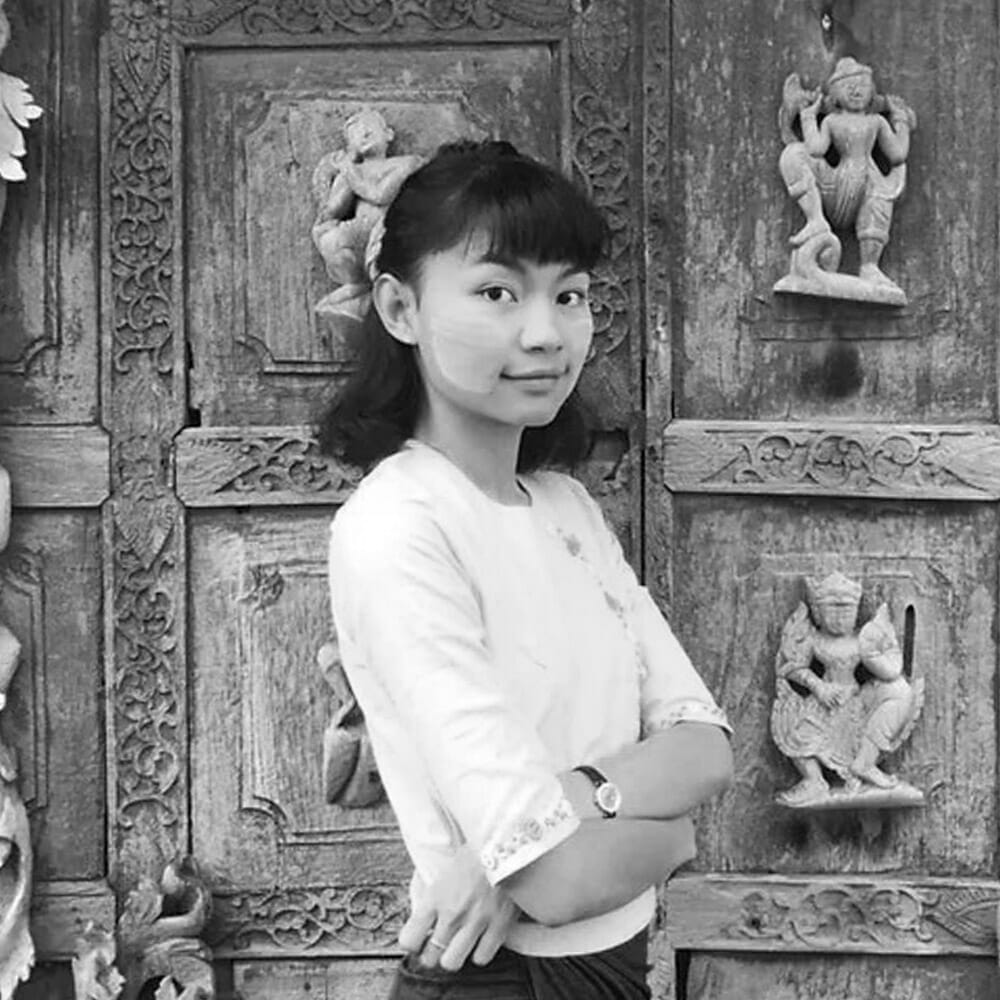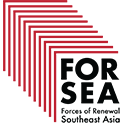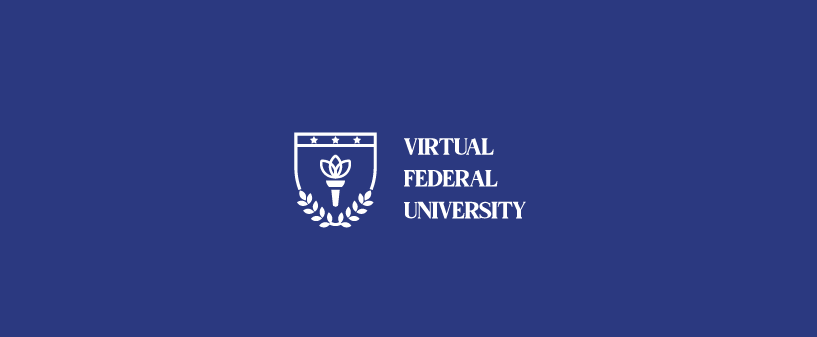The 2009 monsoon had a lasting impact on my decision to become an educator. I spent most of it at a Buddhist monastery in Thanlyin, across the river from Yangon. As a first-year university student of distance education with a lot of free time on my hands, I jumped on it when the opportunity to volunteer as a teacher arose.
Every weekend, I would get up early to catch a bus from my house in Hlaing to a meetup location with other volunteers, most of whom were university students like myself, in Yankin. Altogether, we’d catch a Dina bus out to Thanlyin. We’d then transfer to a tractor out to the monastery located in a remote forestry part of Thanlyin. A head monk at the local monastery had taken it upon himself to offer free education to children in his surrounding area whose parents couldn’t afford to send them to public schools.
Unlike formal monastic education in other parts of the country, we had no formal structure at this monastery. We would put a group of children at a similar grade-level and teach them together. The monk taught Burmese literature which was influenced by Buddhist teachings while he encouraged us to teach, in his words, “western subjects” like Math, Science, and English.
Without any sort of teacher training or pedagogical guidance, we helped each other with navigating classroom management and brainstorming in-class activities over free lunches that the monastery would prepare for us as a gesture of gratitude.
Young, inexperienced, and perhaps also naive, we were often speechless to our students’ questions of, “Why do we have to come to class when we could spend that time earning money for our families, either working as a bus spare or shepherding cows?” We knew that education was important, but we never paused to question how our teaching efforts might fit the lifestyles of those in social contexts that were different from us.
Today, as current discourse on education for Myanmar is shifting, I find an opportunity to rethink those questions I once didn’t care to think deeply about.
Education, Burmanized and Slave-Like
Regardless of the free education it intended to offer, the monastery I volunteered at shared one fundamental ideology about education with formal public schools in Myanmar. The head monk knew the importance of teaching Math, English, and Science to his students. At the same time, to him, Burmese language, Burmese literature, and Buddhist teachings were equally, if not more, important as those “western subjects.” We didn’t question his efforts to Burmanize the students either.
The education system is a salient sector in which the bama Buddhist majority in the country forces to instill this internal neocolonial practice and mindset that “the bama Buddhist way is the only way to go” among non-bama and non-Buddhist people in the country. In the extreme case of exclusion against the Rohingya, the state doesn’t even consider them worthy of such influence and assimilation.
Neocolonialism is the practice of using cultural imperialism, economics, and other mechanisms to influence a country and/or a social group. Unlike colonialism, neocolonialist states may not use direct control but continue to exert power over their former colonies or culturally and socially minoritized groups. Neocolonialism as a system enforces a belief, either explicitly or implicitly, among the people of targeted oppressed groups that only the ways of life of the powerful are better, nicer, cleaner, more correct, and therefore something to be desired.
Burmanization has been an internal neocolonial process in Myanmar.
The process of forcefully assimilating one to bama/Buddhist way of life, or Burmanization through schooling has long been criticized. Even in the city like Yangon where I went to school, students were required and expected to perform and assimilate into mainstream bama Buddhist culture. Every school day started with chanting Buddhist prayers followed by a fifteen-minute session of meditation. Teachers and schools made no accommodation for the students with other religious beliefs. The language that the teachers used to teach is solely Burmese as if students with their first languages other than Burmese were usually treated with a “sink or swim” mentality, that is, either they learn to assimilate and master the mainstream culture, or they fall behind the rest of the class and ultimately the rest of the society.
Unfortunately, these Burmanizing efforts in education are widespread across non-formal education like monastic education and extracurricular teaching. Furthermore, all attempts to “deburmanize” our society have been unsuccessful.
Recent direct military control of Myanmar’s education system has further exacerbated this lingering problem of internal neocolonial education.

Teacher Daw Tin Nwe Yee, a 59-year-old mother of two daughters, who died during the bloody crackdowns in Yangon. Photo: The Irrawaddy
The death of Daw Tin Nwet Yi, a primary school teacher, during the crackdown of a Yangon protest in February 2021 and the military’s suspension of teachers for joining the CDM (Civil Disobedience Movement) are evidences that the education sector is one of the important targets, if not the most, of violent authoritarianism. Both parents’ and students’ boycott against the forceful military control over education has given us a new (or perhaps revived) vocabulary to refer to the Myanmar’s education: “military slave education” (စစ်ကျွန်ပညာရေး). There have been nationwide protests against the “military slave education” since February 2021.
However, only focusing on the military slave education endangers us to ignore other internal and external neocolonial practices like Burmanization and Westernization deeply embedded in our society. It could also potentially lead us to ignore how we must critically reflect on resisting and abolishing those processes to liberate ourselves.
Looking Outward
At the moment, some educational initiatives are in the process of recognizing and reversing the long-lasting effects of Burmanization in our society. This is obvious when we look at the different alternatives to mainstream education now being offered for students in the country such as Virtual Federal University (VFU) Myanmar, for free and Spring University Myanmar (SUM), both with low fees.
There are also grassroot efforts to offer free education to students in Myanmar that are not publicly advertised yet. In addition, some existing non-mainstream educational organizations like Parami University, a self-proclaimed “Myanmar’s first private liberal arts and sciences university,” have also offered free courses for post-graduate or undergraduate-level students. All these initiatives aspire to mold a different kind of education for our future by offering courses in ethnic languages of Myanmar and/or on the topics of federalism, human rights, and democracy.
Understandably in order to execute these missions of resistance against the military slave education and also the “bama-Buddhist supremacy”, limited financial and human resources within the country have forced these alternative educational initiatives to look beyond the borders of Myanmar.
Initially, VFU’s catalog offers asynchronous modules, voluntarily submitted to VFU by researchers and professors who are outside of Myanmar or not from Myanmar (at least according to the names that are public on VFU website). VFU also partners with Princeton University’s EdX Program to offer free online courses on social sciences and humanities.
SUM offers courses under a model of Schools: Centre for College Preparation, School of Federalism and Peace Studies, STEM School, Law School, School of Arts and Social Sciences, School of Languages, and School of Economics. Some of the SUM courses are being taught by those who have been educated abroad in the west. (This information is accessible via the instructor’s bio in the course announcements although names withheld.)
During the months of June and July in 2021, Parami Institute of Continuing Education also offered twelve free online courses, most of which were taught in English by non-Myanmar scholars. (Some of these courses titled “Social Psychology;” “Ethics, Politics, and Economics”; “Writing for Social Change”; “Ethnicity and Belonging in Myanmar”; “Human Rights”; and “Democracy” attempted to satisfy current public desire to learn more about those topics in the aftermath of the coup.)
These initiatives are important as they emerge at a time of demand coming from the student population itself. Yet, the questions I ignored while volunteering at the monastery still linger on my mind. At the time of crisis, why do we look to education to make social change? Which education would help us make that change? Who decides what kind of education makes change? And most importantly, when and how does education become a capitalizable commodity?
Slippery Slope
Personally, I have also invested significant time and efforts in those initiatives with the hope that intellectual and ideological revolution would sustain our broader mission of revolution against all forms of oppression for the long run, not just the militarized violence.
However, there is a slippery slope between overturning the Burmanized and military slave education, and replacing it with an external neocolonial one, especially a white supremacist version of it. I am deeply concerned about the unquestioned external neocolonialist beliefs that education, especially western knowledge, is doing good to the students and to our society; that western worldviews will bring change in our society or at least contribute to that change; that the students should either remain in the country and education will be “brought in” to them flowing from the west to the east, or that they should leave the country to be trained abroad. (There have been Twitter debates on this last topic.)
Here, it is important to note that the west itself is not monolithic; there are social groups that suffer from similar forms of oppression that peoples of Myanmar face in the west, for example, Black people, Muslims, immigrants, and more. If we must still import education from the west, why then don’t we intend to learn from those who share a similar struggle with us and who could build parallel solidarities rather than the mainstream white western version? Perhaps, those of us who study abroad in the west have also been influenced by this white supremacist education. To paraphrase from anthropologist Francis Nyamnjob, we are also the products of (neo)colonial education that expects to reproduce the “mimics and caricatures” that only replicate the so-called education we’ve learned in the west but not to be critical of it (Decolonizing the University in Africa, 2019).
My experience in the US has shown me that western education itself functions with an assimilationist ideology in which Black, brown, Indigenous students and students of color are encouraged (or given a spot in so-called prestigious universities and colleges) only to be integrated into mainstream ways of thinking and practices. And if we are to question those practices, we are perceived as “troublemakers,” “undisciplined,” and therefore “uncivilized” and “unsuccessful.”
The white western neocolonialist beliefs in Myanmar don’t just materialize for education and for the current moment. I’ve listened to my mother refer to the US as a “superpower country” a thousand times. I’ve watched girls in Myanmar desire to have fairer skins. I’ve been told, as a Burmese woman, to date a white man rather than other men of color because my children will then be “adorable” (ချစ်စရာကောင်း). Even in the aftermath of the coup, I’ve witnessed social justice activists praising American democracy as a model for Myanmar’s new future while either consciously or subconsciously adhering to the US exceptionalism (i.e., literally the ideology that everything that the US is and does is exceptional). This belief in the US exceptionalism also prepares those who seek political asylum in the US as owing forever debts to the US, or to behave as “good refugees,” to echo Vietnamese American sociologist Yến Lê Espiritu. I’ve been critiqued by my fellow Myanmar peoples for so outwardly critiquing the US while for most of them, it is, righteously so, a place of sanctuary after fleeing the authoritarian state of Myanmar. Yet, we can’t afford to forget that falling prey onto the US and western imperialism(s) does not liberate us but further holds us in place in our chains.
These neocolonial practices and mindsets that white people do things better than us have long been held by peoples of Myanmar across different social, cultural, economic, and political aspects. This is an example in which colonization continues to take place under the influence and forces of white cultural imperialism through modes and currents of economy, consumerism, and globalization, including education, even in the name of revolution.
Question Left to Ask
Critique, unlike criticism, can be productive when done reflexively and carefully. In a time of potential opportunity to make impactful change, it is imperative that we find a productive balance between revolting against the layers of neocolonial oppressions: bama Buddhist supremacy (the belief that bama Buddhist people are more superior than the other ethnic and religious groups and therefore they should dominate the postcolonial Myanmar society) and white western supremacy (the belief that white western people are the most superior race and therefore they should subjugate other racial and ethnic groups).
Just as I’d now ask the naive version of me volunteering to teach the disadvantaged students, I’d also ask those white people and privileged Myanmar expats, either educated in the west or currently in the west, who are now involved with those educational initiatives (including myself), “Why do we feel the need to step in?”
The younger version of me would pause at the question of whether I volunteered for teaching at the monastery because I believed in the propagandized education imported from the mainstream society to a remote part of town, or simply because I enjoyed being able to enter in and out of the lives of those who were more unfortunate than mine. It could also be worthwhile for the white people, Myanmar expats, and those in the diaspora to reflect on the parallel questions when it comes to our engagement with those educational initiatives.
I still believe that education is and can be one of the important revolutionary acts as bell hooks writes in Education as the Practice of Freedom and Saw Kapi recently reflects. “What does that activist/revolutionary-education look like?” (I appreciate educational spaces initiated and led by the University of Yangon Interim University Council like Thit Pote-သစ်ပုပ်.)
As I regret not questioning the head monk’s decision to Burmanize the students through education, I wonder if we are also setting out only to regret later not questioning the process of westernizing the Myanmar students by assigning certain ideas, texts, and theories to them during this time of political and social rupture. If we must totally do away with our local and embodied knowledge (which I don’t believe we should; we must also be careful and critical about how we define and position the “locale” in this context) and import “outside” education to the students in Myanmar, shouldn’t we rather consider forming ideological and tangible solidarity with other groups subjected to systemic oppressions like racism, sexism, capitalism, and militarism that also affect us? We would then understand that the oppressive system shows up wearing different masks in different geographical and social locations. We can learn from each other to fight it back rather than locking ourselves away in the silos that the oppressor created for us.
In the aftermath of the coup, #abolishthemilitary has become a popular hashtag for Myanmar social media users joining the global movement towards abolishing militarized violence especially against Black, Indigenous, and People of Color, or to compete for an attention from those “superpower” neocolonialist states and entities like the US, Europe and the UN to “save Myanmar.” The anti-coup sentiments and resistance should neither be selective to the oppression by the Myanmar military and Burmanization, nor should we perpetuate a mutated growth of oppressive forces against another social group both within and outside of Myanmar. Rather, a true abolitionist practice must work to see and dismantle transnational, intersectional, and parallel forms of oppression in our society beyond national sovereignties and state borders.
As educators continue to contribute to Myanmar’s Spring Revolution, it is vital to keep asking ourselves: Could the white supremacist neocolonial education really be a solution to the military slave education and other internal oppressive structures in Myanmar society? If the answer is no, we must ask how we also revolutionize the ways we offer, practice, and imagine education because our futures depend on it.
Chu May Paing
FORSEA Board Member
 Chu May Paing is a writer, anthropologist, and decolonial-feminist in progress. Born and raised in Yangon, Myanmar and currently a migrant in the US, Chu is infatuated with the migrants’ stories of diasporic kinship, belonging, and refusal towards their newly adapted ways of life. She is interested in engaging with the concepts of temporal positionalities, intense feelings, and shifting materialities in attempting to understand what it means to be a human. Chu believes that the personal is truly the political and therefore aspires to use authoethnography as a critical reflexive tool of refusal against the white, masculine, and colonial gaze. Chu is a founder and co-director at Aruna Global South, a non-profit promoting experimental scholarship and systematically marginalized scholars and thinkers working in, on, and from the Asian Global South. When she is not questioning her own privileged upbringings as a bama Buddhist woman, she writes against whiteness and neocoloniality in academia and in Burma. Chu also writes in Burmese under the pen name Ma Chinthe (Miss Lion).
Chu May Paing is a writer, anthropologist, and decolonial-feminist in progress. Born and raised in Yangon, Myanmar and currently a migrant in the US, Chu is infatuated with the migrants’ stories of diasporic kinship, belonging, and refusal towards their newly adapted ways of life. She is interested in engaging with the concepts of temporal positionalities, intense feelings, and shifting materialities in attempting to understand what it means to be a human. Chu believes that the personal is truly the political and therefore aspires to use authoethnography as a critical reflexive tool of refusal against the white, masculine, and colonial gaze. Chu is a founder and co-director at Aruna Global South, a non-profit promoting experimental scholarship and systematically marginalized scholars and thinkers working in, on, and from the Asian Global South. When she is not questioning her own privileged upbringings as a bama Buddhist woman, she writes against whiteness and neocoloniality in academia and in Burma. Chu also writes in Burmese under the pen name Ma Chinthe (Miss Lion).
As further reading on this topic, please see Zar Ni (1998) “Knowledge, Control, and Power: Politics of Education Under Burma’s Military Dictatorship (1962-88)”, Unpublished PhD Dissertation, University of Wisconsin at Madison, USA. https://www.maungzarni.net/
Banner image: Vlada, Unsplash



